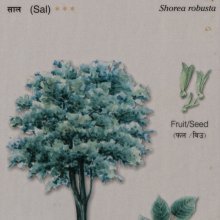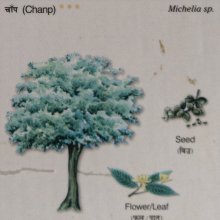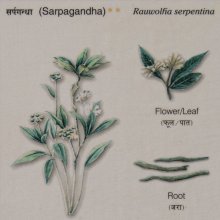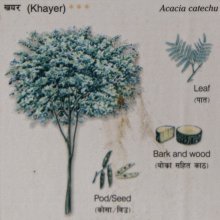Pat, Paṭ, Pāṭ, Pāt: 12 definitions
Introduction:
Pat means something in Hinduism, Sanskrit, Hindi, biology. If you want to know the exact meaning, history, etymology or English translation of this term then check out the descriptions on this page. Add your comment or reference to a book if you want to contribute to this summary article.
Images (photo gallery)
(+2 more images available)
Biology (plants and animals)
Source: Wisdom Library: Local Names of Plants and DrugsPat [पात] in the Konkani language is the name of a plant identified with Pogostemon heyneanus Benth. from the Lamiaceae (Mint) family having the following synonyms: Pogostemon suavis. For the possible medicinal usage of pat, you can check this page for potential sources and references, although be aware that any some or none of the side-effects may not be mentioned here, wether they be harmful or beneficial to health.
Pat [पाट] in the Hindi language is the name of a plant identified with Corchorus olitorius L. from the Tiliaceae (Phalsa) family.
Source: Google Books: CRC World Dictionary (Regional names)Pat in India is the name of a plant defined with Corchorus capsularis in various botanical sources. This page contains potential references in Ayurveda, modern medicine, and other folk traditions or local practices.
Example references for further research on medicinal uses or toxicity (see latin names for full list):
· Journal of Fujian Agricultural College (1986)
· Cytologia (2000)
· Cytologia (1992)
· Acta Genetica Sinica (1994)
· Science and Culture (1979)
· Taxon (1982)
If you are looking for specific details regarding Pat, for example side effects, health benefits, diet and recipes, extract dosage, pregnancy safety, chemical composition, have a look at these references.

This sections includes definitions from the five kingdoms of living things: Animals, Plants, Fungi, Protists and Monera. It will include both the official binomial nomenclature (scientific names usually in Latin) as well as regional spellings and variants.
Languages of India and abroad
Sanskrit dictionary
Source: DDSA: The practical Sanskrit-English dictionaryPaṭ (पट्).—I. 1 P. (paṭati) To go or move. -Caus. or 1 U. (pāṭayati-te)
1) To split, cleave, tear up, tear asunder, tear open, divide; कंचिन्मध्यात् पाटयामास दन्ती (kaṃcinmadhyāt pāṭayāmāsa dantī) Śiśupālavadha 18.51; दत्त्वर्णं पाटयेल्लेखम् (dattvarṇaṃ pāṭayellekham) Y.2.94; Mṛcchakaṭika 9.
2) To break, break open; अन्यासु भित्तिषु मया निशि पाटितासु (anyāsu bhittiṣu mayā niśi pāṭitāsu) Mṛcchakaṭika 3.14.
3) To pierce, prick, penetrate; दर्भपाटिततलेन पाणिना (darbhapāṭitatalena pāṇinā) R.11.31.
4) To remove, eradicate.
5) To pluck out.
6) To shine.
7) To speak. -II. 1. U. (paṭayati-te)
1) To string or weave; कुविन्दस्त्वं तावत् पटयसि गुणग्राममभितः (kuvindastvaṃ tāvat paṭayasi guṇagrāmamabhitaḥ) K. P.7.
2) To clothe, envelop.
3) To surround, encircle.
--- OR ---
Pat (पत्).—I. 1 P. (patati, patita)
1) To fall, fall down, come down, descend, drop down, alight; अवाङ्मुखस्योपरि पुष्पवृष्टिः पपात विद्याधरहस्तमुक्ता (avāṅmukhasyopari puṣpavṛṣṭiḥ papāta vidyādharahastamuktā) R.2.6; वृष्टिर्भवने चास्य पेतुषी (vṛṣṭirbhavane cāsya petuṣī) 1.77; (reṇuḥ) पतति परिणतारुणप्रकाशः शलभसमूह इवाश्रमद्रुमेषु (patati pariṇatāruṇaprakāśaḥ śalabhasamūha ivāśramadrumeṣu) Ś.1.31; Meghadūta 17; Bhaṭṭikāvya 7.9;21.6.
2) To fly, move through the air, soar; हन्तुं कलहकारोऽसौ शब्दकारः पपात खम् (hantuṃ kalahakāro'sau śabdakāraḥ papāta kham) Bhaṭṭikāvya 5.1; see पतत् (patat) below.
3) To set, sink (below the horizon); सोऽयं सोमः पतति गगनादल्पशेषमैर्यूखैः (so'yaṃ somaḥ patati gaganādalpaśeṣamairyūkhaiḥ) Ś.4.2 v. l.; पतत्पतङ्गप्रतिमस्तपो- निधिः (patatpataṅgapratimastapo- nidhiḥ) Śiśupālavadha 1.12.
4) To cast oneself at, throw oneself down, मयि ते पादपतिते किंकरत्वमुपागते (mayi te pādapatite kiṃkaratvamupāgate) Pañcatantra (Bombay) 4.7; so चरणपतितम् (caraṇapatitam) Meghadūta 15;
5) To fall (in a moral sense), lose one's caste, forfeit one's rank or position, fall off; परधर्मेण जीवन् हि सद्यः पतति जातितः (paradharmeṇa jīvan hi sadyaḥ patati jātitaḥ) Manusmṛti 1.97;3.16;5.19;9.2; Y.1. 38.
6) To come down (as from heaven); पतन्ति पितरो ह्येषां लुप्तपिण्डोदकक्रियाः (patanti pitaro hyeṣāṃ luptapiṇḍodakakriyāḥ) Bhagavadgītā (Bombay) 1.42.
7) To fall, be reduced to wretchedness or misery; प्रायः कन्दुकपातेनोत्पतत्यार्यः पतन्नपि (prāyaḥ kandukapātenotpatatyāryaḥ patannapi) Bhartṛhari 2.123.
8) To go down into hell, go to perdition; Manusmṛti 11.37; प्रसक्ताः कामभोगेषु पतन्ति नरकेऽशुचौ (prasaktāḥ kāmabhogeṣu patanti narake'śucau) Bhagavadgītā (Bombay) 16.16.
9) To fall, occur, come to pass, take place; लक्ष्मीर्यत्र पतन्ति तत्र विवृतद्वारा इव व्यापदः (lakṣmīryatra patanti tatra vivṛtadvārā iva vyāpadaḥ) Subhāṣ.
1) To be directed to, light or fall upon (with loc.); प्रसादसौम्यानि सतां सुहृज्जने पतन्ति चक्षूंषि न दारुणाः शराः (prasādasaumyāni satāṃ suhṛjjane patanti cakṣūṃṣi na dāruṇāḥ śarāḥ) Ś.6.29.
11) To fall to one's lot or share.
12) To be in, fall in or into. -Caus. (pātayati-te, patayati rarely)
1) To cause to fall down, descend or sink &c.; निपतन्ती पतिमप्यपातयत् (nipatantī patimapyapātayat) R.8.38;9.61;11.76.
2) To let fall, throw or drop down, fell down (as trees &c.).
3) To ruin, overthrow; व्यपदेशमाविलयितुं किमीहसे जनमिमं च पातयितुम् (vyapadeśamāvilayituṃ kimīhase janamimaṃ ca pātayitum) Ś.5. 21.
4) To shed (as tears).
5) To cast, direct (as the sight).
6) To dash or strike out.
7) To throw or put in, cause to enter.
8) To bring to ruin or misfortune.
9) To depreciate, lower the value of anything; अर्घतः पातिताः (arghataḥ pātitāḥ) Bhartṛhari 2.15.
1) (In arith.) To subtract, deduct.
11) To set in motion, set on foot. -Desid. (pipatiṣati or pitsati) To wish to fall. -II. 4.Ā. (patyate) Ved.
1) To be master of.
2) To rule, control.
3) To possess.
4) To be fit for, serve for (with dat.) -III. 1. U. (patayati-te)
1) To go, move.
2) To be master of (intransitive).
--- OR ---
Pāṭ (पाट्).—ind. An interjection used in calling.
--- OR ---
Pāt (पात्).—a. Protecting, guarding. -m.
1) Falling.
2) Sin.
3) A guardian.
Source: Cologne Digital Sanskrit Dictionaries: Shabda-Sagara Sanskrit-English DictionaryPaṭ (पट्).—[paṭa] r. 1st cl. (paṭati) To go, to move. r. 10th cl. (paṭayati-te) 1. To string. 2. To surround or encompass. 3. To share, to portion, to distribute. (pāṭayati-te) 1. To speak. 2. To shine. With ut prefixed, To pluck up, to eradicate, to destroy utterly. With vi, To fly, to run away. gatau bhvā0 para0 saka0 seṭ . dīptau0 cū0 ubha0 aka0 seṭ . veṣṭane, ada0 cu0 ubha0 saka0 seṭ .
--- OR ---
Pat (पत्).—[(ḷ)patḷ] r. 1st. cl. (patati) r. 10th cl. (patayati-te or pātayati-te) 1. To go, to move, but especially downwards, as, to fall, to descend, to alight. 2. To possess supreme or superhuman power. r. 4th cl. (patyate) To be rich or powerful. With ati prefixed. To excel or surpass. With abhi or ava, To descend. With āṅ, To arrive, to come. With ut, To ascend. With ni 1. To gain or get. 2. To happen. With nira, To abscond. With pari, 1. To go fast. 2. To be valuable. With pra and ni, To fall prostrate, to salute, to worship. With vi and nira, To turn, to turn back. With sam, 1. To go with. 2. To gain. With āṅ, To purify or cleanse. With sam and un, To fly. With sam and ni, To go forth or out. gatau ada0 cu0 ubha0 saka0 aiśye0 aka seṭ . aiśye di0 ā0 aka0 seṭ . gatau bhvā0 para0 saka0 aiśye aka0 jvalā0 seṭ .
--- OR ---
Pāṭ (पाट्).—ind. A vocative particle or interjection used in calling. E. paṭ to go, in the causal form, aff. ṇic kvip .
--- OR ---
Pāt (पात्).—m. (-pāt) 1. Falling. 2. Sin, wickedness. E. pat to fall, aff. kkipa, and the radical vowel made long.
--- OR ---
Pāt (पात्).—mfn. (-pān-pāntī-pāt) Who or what defends or preserves, a guardian, a protector, &c. E. pā to preserve, aff. śatṛ.
Source: Cologne Digital Sanskrit Dictionaries: Benfey Sanskrit-English DictionaryPaṭ (पट्).—† i. 1, [Parasmaipada.] To go, to move. i. 10, pāṭaya, 1. † To speak, or to shine. 2. To split, to divide, Mahābhārata 3, 16747; 882. 3. To break, to breach, [Mṛcchakaṭikā, (ed. Stenzler.)] 47, 16. 4. To tear, [Kathāsaritsāgara, (ed. Brockhaus.)] 20, 21. 5. To pluck out, 28, 21. 6. To cause to be torn up, [Yājñavalkya, (ed. Stenzler.)] 2, 94. † 7. i. 10, paṭaya, To string, to surround.
— With the prep. ava ava, pāṭaya, To split, [Suśruta] 1, 32, 12.
— With ā ā, pāṭaya, To split, [Suśruta] 2, 22, 19.
— With ud ud, pāṭaya, 1. To tear out, [Mānavadharmaśāstra] 4, 69. 2. To slit up, [Rājataraṅgiṇī] 5, 432. 3. To open, [Pañcatantra] 222, 5. 4. To destroy, [Rāmāyaṇa] 6, 88, 19. 5. To remove, 6, 37, 87. 6. To dethrone, [Rājataraṅgiṇī] 5, 298.
— With samud sam-ud, pāṭaya, 1. To tear out, [Rāmāyaṇa] 5, 39, 23. 2. To draw out, [Devīmāhātmya, (ed. Poley.)] 2, 20. 3. To dethrone, [Rājataraṅgiṇī] 5, 286.
— With vini vi-ni, pāṭaya, To split, [Bhāgavata-Purāṇa, (ed. Burnouf.)] 2, 7, 16.
— With vi vi, pāṭaya, 1. To split, Mahābhārata 12, 591. 2. To tear, [Harivaṃśa, (ed. Calc.)] 4310. 3. To uproot, [Rājataraṅgiṇī] 5, 477. 4. To open, 3, 482 (to bring on).
--- OR ---
Pat (पत्).—i. 1, [Parasmaipada.] (in epic poetry also [Ātmanepada.]), 1. To fly, [Bhāgavata-Purāṇa, (ed. Burnouf.)] 8, 6, 39. 2. To descend, to set, Mahābhārata 6. 480. 3. To fall down, [Bhāgavata-Purāṇa, (ed. Burnouf.)] 3, 15, 35. 4. To alight, Böhtl. Ind. Spr. 349. 5. To fall, [Mānavadharmaśāstra] 5, 141; figuratively, [Bhartṛhari, (ed. Bohlen.)] Suppl. 14. 6. To be deprived of one’s caste or rank, [Mānavadharmaśāstra] 3, 16. 7. To fall on, Mahābhārata 3, 2199. 8. To devolve upon, [Rāmāyaṇa] 2, 22, 20. 9. To happen, [Pañcatantra] 232, 25. Ptcple. of the pres. patant, m. A bird, [Raghuvaṃśa, (ed. Stenzler.)] 13, 19. Ptcple. of the pf. pass. patita, Sprung from, Böhtl. Ind. Spr. 240. n. Flying, Mahābhārata 8, 1910. Comp. Sāvitrī-, m. a man of the three first classes, not invested at the proper time with the sacrificial cord, [Mānavadharmaśāstra] 2, 39.
— Ptcple. of the fut. pass., 1. pataniya, n. A degrading crime, [Yājñavalkya, (ed. Stenzler.)] 3, 298. 2. patitavya, n. Going to hell, Mahābhārata 12, 3668. [Causal.] pātaya, 1. To cause to descend, [Hitopadeśa] iv. [distich] 74. 2. To cause to fall down, [Rāmāyaṇa] 1, 74, 13. 3. To dash out, [Bhāgavata-Purāṇa, (ed. Burnouf.)] 4, 5, 21. 4. To throw, [Rāmāyaṇa] 6, 82, 93. 5. To inflict, [Mānavadharmaśāstra] 8, 126. 6. To shed, Mahābhārata 7, 4912. 7. To cause to enter, [Vikramorvaśī, (ed. Bollensen.)] [distich] 56. 8. To set (fire to), [Pañcatantra] iii. [distich] 166. 9. To direct, [Rāmāyaṇa] 4, 7, 11. 10. To ruin, 6, 94, 19. 11. To cause to sin, [Śākuntala, (ed. Böhtlingk.)] [distich] 117. 12. To throw one’s self, Mahābhārata 1, 6752.
— With the prep. ati ati, To neglect. Comp. ptcple. of the fut. pass. an-atipātya, Not to be neglected, [Śākuntala, (ed. Böhtlingk.)] 60, 17. [Causal.] 1. To deprive something of its effect, [Suśruta] 1, 146, 12. 2. To kill, 2, 266, 13.
— With anu anu, 1. To fly along or in, [Bhāgavata-Purāṇa, (ed. Burnouf.)] 3, 11, 5. 2. To follow, [Śākuntala, (ed. Böhtlingk.)] [distich] 7. [Causal.] To cause somebody to fall down with one’s self, [Rāmāyaṇa] 2, 75, 4 Gorr.
— With abhi abhi, 1. To fly near, to run near, especially with the intention of assailing, Mahābhārata 3, 550. 2. To fall down to (acc.), [Arjunasamāgama] 10, 30. 3. To be shed, Mahābhārata 7, 6287. 4. To overtake, Mahābhārata 8, 1910. [Causal.] 1. To cast on somebody (acc.), [Harivaṃśa, (ed. Calc.)] 13902. 2. To cast down, Mahābhārata 6, 1684.
— With samabhi sam-abhi, To assail, [Rāmāyaṇa] 5, 41, 34.
— With ava ava, 1. To fly down, [Prabodhacandrodaya, (ed. Brockhaus.)] 66, 14. 2. To jump down, [Harivaṃśa, (ed. Calc.)] 15949. 3. To fall down, [Rāmāyaṇa] 2, 28, 12. keśa-kīṭa-avapatita, On which lice have fallen, Mahābhārata 13, 1577. [Causal.] To throw down, [Kathāsaritsāgara, (ed. Brockhaus.)] 25, 42.
— With ā ā, 1. To fly near, to run near, especially with the intention of assailing, Mahābhārata 1, 5965. 2. To fall down, [Rājataraṅgiṇī] 3, 202. 3. To appear unexpectedly, Mahābhārata 3, 2564. 4. To strike unexpectedly, [Rāmāyaṇa] 2, 62, 16. 5. To befall, 6, 100, 5. 6. To come to one’s share, [Kathāsaritsāgara, (ed. Brockhaus.)] 20, 213. 7. To happen. [Causal.] 1. To throw down, [Bhāgavata-Purāṇa, (ed. Burnouf.)] 7, 8, 29. 2. To kill, [Harivaṃśa, (ed. Calc.)] 5598. 3. To shed, [Mānavadharmaśāstra] 3, 229.
— With abhyā abhi-ā, 1. To run near, Mahābhārata 4, 807. 2. To assail, 4, 1041.
— With paryā pari-ā, To run away, Mahābhārata 8, 4964.
— With samā sam-ā, 1. To fly near, Mahābhārata 5, 7213. 2. To hasten near. 3. To assail. 4. To obtain, Mahābhārata 1, 7213. 5. To have sexual intercourse, Mahābhārata 1, 2461.
— With ud ud, 1. To fly upwards, Mahābhārata 1, 1335. 2. To jump upwards, to start up, 1, 6019. 3. To hasten out of (with abl.), Mahābhārata 12, 5224. 4. To come out, 6, 5785. 5. To be set up (as a cry), Mahābhārata 1, 6111.
— With anūd anu-ud, To start up, to get up after somebody (acc.), [Rāmāyaṇa] 5 64, 24.
— With abhyud abhi-ud, 1. To fly upwards to (acc.), [Kathāsaritsāgara, (ed. Brockhaus.)] 22, 144. 2. To start up, [Harivaṃśa, (ed. Calc.)] 4114.
— With samud sam-ud, 1. To fly up together, Mahābhārata 3, 2093. 2. To start up together, 1, 7005. 3. To assail, Böhtl. Ind. Spr. 315. 4. To ascend, [Rāmāyaṇa] 5, 74, 35. 5. To rush out of, Mahābhārata 7, 4656. 6. To gush out of, [Harivaṃśa, (ed. Calc.)] 7068. samutpatita, 1. Springing upwards, [Pañcatantra] ed. orn. i. [distich] 108. 2. Sprung up, Mahābhārata 1, 3320. 3. Disappeared, Pañc i. [distich] 212.
— With upa upa, To hasten to, [Bhāgavata-Purāṇa, (ed. Burnouf.)] 7, 2, 31.
— With ni ni, 1. To fly down, Mahābhārata 1, 2094. 2. To descend, [Harivaṃśa, (ed. Calc.)] 9611. 3. To fall down, Mahābhārata 13, 1501. 4. To tumble down, [Rāmāyaṇa] 5, 18, 7. 5. To assail, Mahābhārata 4, 1572. 6. To rush in, Böhtl. Ind. Spr. 1170. 7. To empty one’s self into, [Raghuvaṃśa, (ed. Stenzler.)] 10, 27. 8. To fall on, Mahābhārata 1, 7708. 9. To fall into, [Bhartṛhari, (ed. Bohlen.)] 2, 82. 10. To take place, [Mānavadharmaśāstra] 9, 47. [Causal.] 1. To cause to fall down, to cause a stick to fall on somebody, i. e. to smite somebody, [Mānavadharmaśāstra] 4, 146. 2. To cast down, [Bhāgavata-Purāṇa, (ed. Burnouf.)] 3, 3, 1. 3. To cast, [Raghuvaṃśa, (ed. Stenzler.)] 5, 217. 4. To drop, [Kathāsaritsāgara, (ed. Brockhaus.)] 2, 10. 5. To inlay with, Mahābhārata 4, 1325. 6. To spit out, Böhtl. Ind. Spr. 438. 7. To direct to, Mārk. P. 61, 41. 8. To kill, Mahābhārata 14, 98. 9. To levy (as tribute) from (abl.), Mahābhārata 12, 3313. 10. To set up as anomalous (in grammar).
— With abhini abhi-ni, [Causal.] To throw down, Mahābhārata 8, 3040.
— With praṇi pra-ni, 1. To fall prostrate, [Mānavadharmaśāstra] 11, 205. 2. To bow respectfully to (acc. dat. and loc.), Mahābhārata 4, 2131. [Causal.] To induce to fall prostrate, [Mālavikāgnimitra, (ed. Tullberg.)] 39, 16.
— With vini vi -ni, 1. To fly down, [Ṛtusaṃhāra] 4, 18. 2. To fall headlong, [Harivaṃśa, (ed. Calc.)] 3650. 3. To attack suddenly, [Kathāsaritsāgara, (ed. Brockhaus.)] 22, 62. 4. To fall in, [Kathāsaritsāgara, (ed. Brockhaus.)] 3, 33. [Causal.] 1. To cause to fall down, Mārk. P. 75, 55. 2. To cop off, Mahābhārata 1, 5279. 3. To inflict, [Rāmāyaṇa] 2, 75, 14 Gorr. 4. To kill, [Mānavadharmaśāstra] 11, 127. 5. To ruin, [Rāmāyaṇa] 6, 94, 23.
— With saṃni sam-ni, 1. To fly down, Mahābhārata 5, 2462. 2. To descend, [Rāmāyaṇa] 5, 62, 10. 3. To perish, Mahābhārata 7, 434. 4. To assemble, to meet, Mahābhārata 3, 14899. 5. To appear, Mahābhārata 12, 6676. [Causal.] 1. To cause to fall down, Mahābhārata 7, 7488. 2. To shoot, [Rāmāyaṇa] 5, 42, 8. 3. To cause to assemble, to convoke, Mahābhārata 3, 2162.
— With nis nis, 1. To fly out of (abl.), [Śākuntala, (ed. Böhtlingk.)] [distich] 166. 2. To rush out, [Arjunasamāgama] 10, 62. 3. To come out, Mahābhārata 14, 1836. 4. To depart from, [Mānavadharmaśāstra] 8, 55. 5. To spring from, 12, 15. 6. To fly away. [Causal.] To ruin, [Rāmāyaṇa] 2, 75, 15.
— With abhinis abhi-nis, To rush out, Mahābhārata 6, 2434.
— With vinis vi-nis, 1. To fly out, Mahābhārata 5, 269. 2. To rush out, [Rāmāyaṇa] 4, 19, 4. 3. To fall out, [Rāmāyaṇa] 3, 31, 19. 4. To run away, [Mānavadharmaśāstra] 7, 106.
— With parā parā, 1. To fly away, [Bhāgavata-Purāṇa, (ed. Burnouf.)] 3, 20, 24. 2. To fail, [Uttara Rāmacarita, 2. ed. Calc., 1862.] 117, 8.
— With pari pari, 1. To fly about, Mahābhārata 1, 1391. 2. To run about, 8, 707. 3. To jump down, 7, 757. 4. To assail, [Arjunasamāgama] 8, 30. 5. To fall, Mahābhārata 3, 2791. [Causal.] 1. To shoot down, Mahābhārata 6, 2687. 2. To shoot off, 6, 1852. 3. To throw in, [Mṛcchakaṭikā, (ed. Stenzler.)] 155, 8.
— With pra pra, 1. To fly away, Mahābhārata 5, 1753. 2. To fly, [Harivaṃśa, (ed. Calc.)] 8266. 3. To run away, Mahābhārata 7, 676. 4. To fall down, Mahābhārata 3, 16038. 5. To strike, Mahābhārata 4, 1788. 6. To fall into, Mahābhārata 2, 2159. 7. To be deprived (abl.), 14, 2737. [Causal.] 1. To put to flight, Mahābhārata 1, 7632. 2. To pursue, 13, 2047.
— With prati prati, To hasten to meet, 4, 2110.
— With vi vi, [Causal.] 1. To discharge (arrows), Mahābhārata 4, 1862. 2. To kill, Mahābhārata 7, 6149.
— With sam sam, 1. To meet, [Indralokāgamana] 1, 36. 2. To fly to (acc.), [Harivaṃśa, (ed. Calc.)] 12684. 3. To hasten to, [Rāmāyaṇa] 5, 36, 43. 4. To obtain, Mahābhārata 12, 6737. 5. To fly, 4, 1776. 6. To walk, [Rāmāyaṇa] 2, 125, 20 Gorr. 7. To fly down, Mahābhārata 6, 3789. 8. To fall down, 1, 1387. 9. To happen, [Harivaṃśa, (ed. Calc.)] 11739. [Causal.] 1. To throw, [Rāmāyaṇa] 6, 18, 50. 2. To throw down, [Bhāgavata-Purāṇa, (ed. Burnouf.)] 5, 26, 28.
— With abhisam abhi-sam, 1. To hasten to, [Rāmāyaṇa] 5, 60, 16. 2. To assail, [Harivaṃśa, (ed. Calc.)] 12545. 3. To fly about, Mahābhārata 7, 7295.
— Cf. [Latin] Penna (i. e. pet + na); [Old High German.] fedara; cf. patra; also (i. e. reduplicat. ), [Latin] petere, impetrare, etc.
--- OR ---
Pat (पत्).— (probably a [denominative.] derived from pati), i. 4, [Ātmanepada.] To be powerful, to possess.
— Cf. [Latin] potiri.
Source: Cologne Digital Sanskrit Dictionaries: Cappeller Sanskrit-English DictionaryPaṭ (पट्).—paṭati split, burst, open ([intransitive]). [Causative] pāṭayati cause to split etc., break asunder, rend, tear, cut off, hurt, injure.
--- OR ---
Pat (पत्).—patati (patate) [participle] patita (q.v.) fly, soar, rush; come down, descend, fall or sink (lit. & [figuratively] ±adhas), lose caste, rank, or position; fall or light upon ([locative]); incur or get into ([locative]); come to pass, happen. [Causative] pātayati, patati (te), [participle] patita (q.v.) fly, soar, rush; come down, descend, fall or sink (lit. & [figuratively] ±adhas), lose caste, rank, or position; fall or light upon ([locative]); incur or get into ([locative]); come to pass, happen. [Causative] pātayate (& patayati q.v.) cause to fly or fall, pour out or shed (water, tears, etc.); hurl, cast, throw; put, turn, direct to, impose or inflict upon ([locative]); throw down, fell, ruin, cut off or asunder, divide (dvedhā); [Middle] rush on, hasten. [Desiderative] pipatiṣati & pitsati being about to fly or to fall in.
Source: Cologne Digital Sanskrit Dictionaries: Monier-Williams Sanskrit-English Dictionary1) Paṭ (पट्):—[class] 1. [Parasmaipada] paṭati, to go, move, [Dhātupāṭha ix, 9];
—to flow ([perfect tense] papāṭa), [Śiśupāla-vadha vi, 72];
—to split, open, burst asunder (intr.), [Harṣacarita];
— [class] 10. or [Causal] paṭayati, to string together, wrap (granthe, or veṣṭane; cf. paṭa), [Dhātupāṭha xxxv, 5];
— pāṭayati, to speak or shine, [Dhātupāṭha xxxiii, 79];
— ti or ([Mahābhārata]) te, to split, burst (trans.), cleave, tear, pierce, break, pluck out, remove, [Upaniṣad; Yājñavalkya; Mahābhārata] etc.:—[Passive voice] pātyate, to split, burst, open (intr.), [Suśruta]
2) Pat (पत्):—1. pat [class] 4. [Ātmanepada] ([Dhātupāṭha xxvi, 50]) patyate, to be master, reign, rule, govern, control, own, possess, dispose of ([accusative] or [instrumental case]), [Ṛg-veda];
2) —to partake of, share in ([locative case]), [ib.];
2) —to be fit or serve for ([dative case]), [ib.]
3) [Prob. [Nominal verb] of pati; cf. [Latin] potiri.]
4) 2. pat [class] 1. [Parasmaipada] ([Dhātupāṭha xx, 15]) patati ([Epic] also te; [perfect tense] papāta, paptima, petatur, paptur; paptivas, [Ṛg-veda]; papatyāt, [Atharva-veda]; [Aorist] apaptat, [Ṛg-veda]; [Passive voice] apāti, [Brāhmaṇa]; [future] patiṣ-yati, [Atharva-veda]; te, patitā, [Mahābhārata]; [Conditional] apatiṣyat, [Brāhmaṇa]; [infinitive mood] patitum, [ib.] etc. etc.; [indeclinable participle] patitvā, [Atharva-veda; Brāhmaṇa]; -patya or -pātam, [Brāhmaṇa]),
—to fly, soar, rush on [Ṛg-veda] etc. etc.;
—to fall down or off, alight, descend (with [accusative] or [locative case]), fall or sink (with or without adhas or narake, ‘to go down to hell’; with caraṇau or ṇayoḥ, ‘to fall at a person’s feet’), [Manu-smṛti; Mahābhārata; Kāvya literature] etc.;
—to fall (in a moral sense), lose caste or rank or position, [Chāndogya-upaniṣad; Manu-smṛti; Yājñavalkya] etc.;
—to light or fall upon, fall to a person’s share ([locative case]), [Mahābhārata; Kāvya literature] etc.;
—to fall or get into or among ([locative case]), [Kathāsaritsāgara; Hitopadeśa];
—to occur, come to pass, happen, [Pañcatantra] :—[Causal] patayati, to fly or move rapidly along, [Ṛg-veda; Vājasaneyi-saṃhitā];
—to speed (trans.; cf. patayat);
— te, to drive away or throw down (?), [Ṛg-veda i, 169, 7];—pātayati ([Epic] also te; [Aorist] apīpatat, [Atharva-veda]; [Passive voice] pātyate, [Mahābhārata] etc.),
—to let fly or cause to fall, to fling, hurl, throw, [Atharva-veda] etc. etc.;
—to lay low, bring down ([literally] and [figuratively]), overthrow, ruin, destroy, [Mahābhārata; Rāmāyaṇa] etc. to throw upon or in, lay on ([locative case]), [Kāvya literature; Suśruta];
— (with or [scilicet] ātmānam) to throw one’s self, [Mahābhārata; Mṛcchakaṭikā];
—to cut off (a head), [Harivaṃśa];
—to knock out (teeth), [Bhāgavata-purāṇa];
—to pour out or shed (water, tears), [Mahābhārata; Harivaṃśa];
—to kindle (fire), [Pañcatantra];
—to cast (dice), [Harivaṃśa; Kathāsaritsāgara];
—to turn, direct, fix (eyes), [Rāmāyaṇa];
—to impose or inflict (punishment), [Manu-smṛti; Yājñavalkya];
—to set in motion, set on foot, [Rājataraṅgiṇī v, 173];
—to seduce to, betray into ([locative case]), [Kathāsaritsāgara];
— (with dvedhā) to divide in two, [Śatapatha-brāhmaṇa];
—to subtract, [Jyotiṣa [Scholiast or Commentator]];
— ([Ātmanepada]) to rush on, hasten, [Ṛg-veda viii, 46, 8] :—[Desiderative] pipatiṣati ([Atharva-veda; Maitrāyaṇī-saṃhitā; Śatapatha-brāhmaṇa]) and pitsati ([Pāṇini 7-4, 54]), to be about to fly or fall:—[Intensive] panīpatyate or pātīti, [Pāṇini 7-4, 84.]
5) cf. [Zend] pat; [Greek] πέτομαι, πί-πτω; [Latin] peto.
6) 3. pat mfn. flying, falling (ifc.; cf. akṣi-pat).
7) [from pad] 4. pat in [compound] for 3. pad.
8) Pāṭ (पाट्):—ind. an interjection used in calling, [cf. Lexicographers, esp. such as amarasiṃha, halāyudha, hemacandra, etc.] ([gana] cādi).
9) Pāt (पात्):—m. (√pat) falling
10) sin, wickedness, [Horace H. Wilson]
Source: Cologne Digital Sanskrit Dictionaries: Yates Sanskrit-English Dictionary1) Paṭ (पट्):—paṭati 1. a. To go or move. (ka) paṭayati 10. a. To string, surround, distribute. pāṭayati to speak; to shine. With vi to run away.
2) Pat (पत्):—(ḷ) patati 1. a. (ka) patayati, pātayati 10. a. To go, to move; to fall; to be superhuman. (ya, ṅa) patyate 4. d. To be rich. With ati prefixed, to excel; abhi or ava to descend; ā to arrive; ut to ascend; ni to gain; nir to abscond; pari to go fast, be valuable; saṃ to go with, to gain; pra and ni to fall prostrate; vi and nir to turn back; saṃ and ā to purify; saṃ and ut to fly; saṃ and ni to go out.
3) Pāṭ (पाट्):—Interj. Oh.
4) Pāt (पात्):—(t) 1. m. Falling; sin.
5) [(pāna-pānto-pāta) a.] Defending.
Source: DDSA: Paia-sadda-mahannavo; a comprehensive Prakrit Hindi dictionary (S)Pat (पत्) in the Sanskrit language is related to the Prakrit words: Paḍa, Visaṭṭa.
[Sanskrit to German]
Sanskrit, also spelled संस्कृतम् (saṃskṛtam), is an ancient language of India commonly seen as the grandmother of the Indo-European language family (even English!). Closely allied with Prakrit and Pali, Sanskrit is more exhaustive in both grammar and terms and has the most extensive collection of literature in the world, greatly surpassing its sister-languages Greek and Latin.
Hindi dictionary
Source: DDSA: A practical Hindi-English dictionary1) Pat in Hindi refers in English to:—(nm) a garment, piece of cloth covering; screen; an allomorph of [patta] meaning favourite, principal (as [patarani]); a door leaf; tail (of a coin); sound of falling or breaking or beating; septa; groomed lock of hair; (a) lying flat, upside down; ineffective, waste (land); effaced, wiped out; ~[katha] screen play; ~[kara] a fabric worker; weaver; ~[pata] recurrent sound of ~[pata; ~mamdapa] pavilion; ~[rani] the queen consort, the principal wife of a king; —[ughadana/khulana] the door leaves to (be thrown) open; —[padana] to lie face downwards; (a venture) to come to a standstill; to be slackened/closed down; —[bamda hona] the door leaves to be shut; —[hona] to come to a nought, to be ruined..—pat (पट) is alternatively transliterated as Paṭa.
2) Pat in Hindi refers in English to:——an allomorph of [patta] used as the first member of compound words; (nf) honour, dignity; ~[jhada/jhara] the fall, autumn; defoliation; —[utha jana] to lose credit, to be trusted no more; —[utarana] to disgrace; to compromise the honour of; to humiliate; —[rakhana] to maintain the dignity of, to preserve the honour of..—pat (पत) is alternatively transliterated as Pata.
...
See also (Relevant definitions)
Starts with (+4057): Pat-gobhi, Pat-inki-an, Pat-pat, Pat-sag, Pat-valli, Pata, Pata con panda, Pata de buey, Pata de cabra, Pata de chivo, Pata de gallina, Pata de gallo, Pata de pollo, Pata de terecay, Pata de toro, Pata de vaca, Pata del monte, Pata siala, Pata visha boddi, Pata-de-burro.
Ends with (+226): Aapat, Aapatvipat, Abhikshipat, Abhinipat, Abhinishpat, Abhipat, Abhisampat, Abhyapat, Abhyavapat, Abhyutpat, Acchapat, Adhipat, Aharasampat, Ajaikapat, Akshipat, Alapat, Alpat, Ambemohor-pat, Antahpat, Antyapat.
Full-text (+787): Patita, Utpata, Papati, Avapatana, Pataka, Utpatana, Atipata, Utpatita, Utpat, Avapat, Samutpatana, Patupata, Pataga, Uppatati, Tanunapad, Sampata, Patuka, Ekashitipad, Patalika, Vipatana.
Relevant text
Search found 52 books and stories containing Pat, Paṭ, Pāṭ, Pāt; (plurals include: Pats, Paṭs, Pāṭs, Pāts). You can also click to the full overview containing English textual excerpts. Below are direct links for the most relevant articles:
Rig Veda (translation and commentary) (by H. H. Wilson)
Garga Samhita (English) (by Danavir Goswami)
Verse 1.4.19 < [Chapter 4 - Description of Questions About the Lord’s Appearance]
Tiruvaymoli (Thiruvaimozhi): English translation (by S. Satyamurthi Ayyangar)
Pasuram 1.10.4 < [Section 10 - Tenth Tiruvaymoli (Poru ma nil patai)]
Pasuram 10.4.8 < [Section 4 - Fourth Tiruvaymoli (Carve tavanori)]
Pasuram 10.3.2 < [Section 3 - Third Tiruvaymoli (Vey maru tol inai)]
Vishnudharmottara Purana (Art and Architecture) (by Bhagyashree Sarma)
5. The Viṣṇudharmottara-purāṇa and the Modern Paintings < [Chapter 6 - Modern Relevance of Different Art Forms and Architecture]
The Philosopher - President of India < [October – December, 1988]
Aquatics or the Water Song < [October - December 1973]
How To Ride The Cycle of Life < [January – March, 2006]
Lord Jhulelal: An Analytical Study (by Thakkar Harish Gopalji)
Part 2 - Lord Jhulelal's teachings to Ruler Mirkshah < [Chapter 4 - Analysis]
Part 5.6 - The Sindh Story < [Chapter 2 - Literature Review]
Related products
(+49 more products available)











